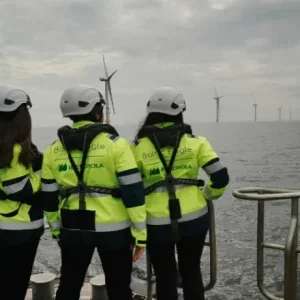As early as 2014, a biogas plant was built at Iffendic with the farmer, now this capacity is doubled. Now the biogas plant generates 500 kilowatts of electricity every day – enough to supply almost 1000 households.
The biogas plant manufacturer WELTEC BIOPOWER is currently launching an expansion project in Iffendic (Bretagne) together with the French partner WELTEC Agripower. As early as 2014, a biogas plant was built at Iffendic with the farmer, now this capacity is doubled. Now the biogas plant generates 500 kilowatts of electricity every day – enough to supply almost 1000 households. In addition to the planning and the high quality of the biogas plant, the first construction project was smoothly implemented for the operator Samuel Morand. This time, too, everything went smoothly: "After a quick approval, the earthworks were quickly completed and WELTEC was able to start its work, which was just as fast," explains the farmer with his young bull and pig fattening project. "This is also because we have a great experience and all processes are routinely implemented with our project partner WELTEC Agripower," says Alain Priser, who is responsible for the France business at WELTEC. This meant that the extended system could be connected to the grid after only a few months of construction.
Samuel Morand had already developed the original biogas plant three years ago. However, since he had only a limited amount of cattle drool, porcine sludge, whole plant silage (GPS), grain cleansing and apple remedies, he initially chose a 2.625 cubic meter stainless steel fermenter with a 250 kilowatt CHP. The other plant components, such as the dosing device or the pump technology, were already anticipated by WELTEC for the double plant size. The robust entry system MULTIMix has also been integrated so that now a second fermenter can be fed without problems. The MULTIMix ensures that long-fiber and sticky substrates, such as beef plaster or GPS, are efficiently crushed so that the entire energy potential can be utilized.
After the operator has successfully expanded his farm in the past years, he now has a larger quantity of beef and pig manure. Even an apple juice producer can now deliver more waste from its production to Morand. This substrate replenishment is the basis for the expansion of the plant by a further 2,625 cubic meter-sized fermenter and another 250 kilowatt CHP.
Another advantage for French farmers is the fact that, in December 2016, the state basic remuneration for imported electricity, especially for the introduction of manure, was added to agricultural biogas plants. The maximum remuneration period has also been extended by five years to twenty years. Both the duration and the level of the tariff ensure more planning and investment security in the sector. Samuel Morand's operation also has a positive effect on the fact that he can use the accumulated cogeneration for his pig pest and a fermentation residue drying.
This measure has many winners: The French are approaching the goal of increasing the share of renewable energies to 30% by the year 2030. Currently, it is around 19 per cent and the contribution of biogas to energy generation is particularly viable. The new remuneration strengthens the role of biogas so that the energy carrier can play its own strength within the energy fields of France. Biogas has advantages over other renewable resources in terms of energy generation and storage that can be influenced in terms of time and quantity. This makes it a valuable part of the energy mix, which not only improves the carbon footprint, but can also make an effective contribution to grid stability, supply security and recycling.






